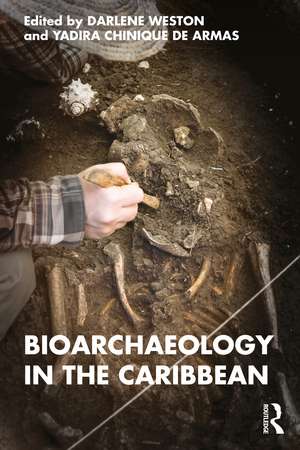Bioarchaeology in the Caribbean
Editat de Darlene Weston, Yadira Chinique de Armasen Limba Engleză Paperback – 13 mar 2025
Chapters emphasize the importance of culture in human adaptation and behaviour at both population and individual levels. The first volume to focus solely on Caribbean bioarchaeology, this book is a landmark in this rapidly advancing area of scholarship, providing insight into current research methods and theoretical debates. The Caribbean region has a long and diverse history, and the chapters reflect this, discussing Indigenous, African and European colonial populations, temporally spanning the Archaic period, the Early and Late Ceramic periods, the time of first European contact, and the Colonial period.
Bioarchaeology in the Caribbean will appeal to undergraduates, postgraduates, and researchers in bioarchaeology and Caribbean bioarchaeology and archaeology, in particular, as well as local stakeholders in the Caribbean (museum and archaeology professionals).
Preț: 245.43 lei
Preț vechi: 313.65 lei
-22% Nou
Puncte Express: 368
Preț estimativ în valută:
46.97€ • 48.86$ • 38.78£
46.97€ • 48.86$ • 38.78£
Carte nepublicată încă
Doresc să fiu notificat când acest titlu va fi disponibil:
Se trimite...
Preluare comenzi: 021 569.72.76
Specificații
ISBN-13: 9781032193878
ISBN-10: 1032193875
Pagini: 472
Ilustrații: 114
Dimensiuni: 156 x 234 mm
Ediția:1
Editura: Taylor & Francis
Colecția Routledge
Locul publicării:Oxford, United Kingdom
ISBN-10: 1032193875
Pagini: 472
Ilustrații: 114
Dimensiuni: 156 x 234 mm
Ediția:1
Editura: Taylor & Francis
Colecția Routledge
Locul publicării:Oxford, United Kingdom
Public țintă
Academic, General, and PostgraduateCuprins
List of Figures; List of Tables; Notes on Contributors; Introduction; Bioarchaeology in the Antilles: Multidisciplinary perspectives to reconstruct people’s lifeways in the past; Section I: Genomic Analyses -- Chapter 1 | Ancient DNA Analysis and its Application to pre-Contact Caribbean Archaeology; Chapter 2 | The Genetic Landscape of the Guadeloupe Archipelago; Chapter 3 | When history meets genomics: Tracing the complex demographic histories of African-descendant communities in the Caribbean; Section II: Deathways, Demography and Health Chapter 4 | A Synthesis of Bioarchaeological Research on Carriacou, Southern Grenadines; Chapter 5 | Pre-Columbian Funerary Bioarchaeology of Puerto Rico and the La Gallera Site, Ceibe, PR; Chapter 6| Paleodemography and Health at Juan Dolio, Dominican Republic; Chapter 7 | Bioarchaeology of Slavery in the Insular Caribbean: Overview, Challenges, and Potential; Chapter 8 | The Caribbean Slave Cemeteries. Example of the French West Indies; Chapter 9 | Bioarchaeology of the Newton Plantation Burial Ground, Barbados: Slavery, Sugar, and the Embodiment of Violence; Section III: Diet and population mobility – Chapter 10 | Infant and Children Feeding Practices in the Precolonial Caribbean: A Cross-Cultural Analysis; Chapter 11 | Isotopic Analysis of Indigenous Paleodiet and Paleomobility in the Western Caribbean: Enamel Strontium and Carbon Isotope Results from Cueva del Perico I, Cuba; Chapter 12 | Eating Local: Modeling Paleodiet in Later Ceramic Age Puerto Rico; Chapter 13 | Investigations at the Royal Naval Hospital Cemetery (c. 1763–1834) in English Harbour, Antigua; Section IV: Research ethics – Chapter 14 | Ethical and sustainable: Towards an archaeology of decolonization in the neo-colonial world; Index.
Notă biografică
Darlene Weston is an Associate Professor of Biological Anthropology at the University of British Columbia in Vancouver, Canada.
Yadira Chinique de Armas is an Associate Professor in Bioanthropology at the Department of Anthropology, University of Winnipeg, Canada.
Yadira Chinique de Armas is an Associate Professor in Bioanthropology at the Department of Anthropology, University of Winnipeg, Canada.
Descriere
Bioarchaeology in the Caribbean assembles leading and emerging scholars in Caribbean bioarchaeology, offering an overview of current research in genomic analyses, deathways, demography and health, diet and population mobility, and research ethics.
